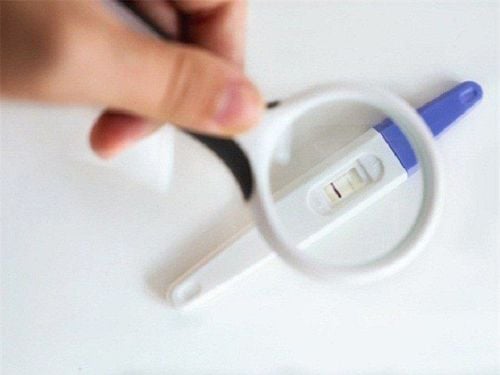This is an automatically translated article.
Endometritis is one of the common gynecological diseases in women of reproductive age, especially postpartum women. If not examined and treated promptly, the disease can directly affect the reproductive health of women in the future.1. Endometrial inflammation is common after childbirth
Endometrial lining is the inner lining of the uterus. The lining will shed and continue to prepare for the next cycle if the egg does not meet the sperm. In the event that the egg and sperm meet and fertilize, the lining becomes the site for the fetus to implant. Uterine endometritis is an inflammation of the lining of the uterus caused by bacteria, fungi, and parasites that invade and develop. Any woman of childbearing age is at risk. In particular, women after giving birth, having a miscarriage or having had an abortion procedure have a higher risk of having this disease.
Endometriosis is usually not life-threatening but needs to be treated early. If left untreated, the infection can lead to dangerous complications such as: Infertility, pelvic peritonitis, pus or abscess in the pelvis or uterus, sepsis, septic shock ( excessive sepsis leading to low blood pressure) - an acute condition that can be life-threatening.
2. Causes of endometritis
2.1 Causes of endometritis in women after childbirth After giving birth, women have some gynecological diseases such as vaginitis, urethritis, cervicitis, gonorrhea, chlamydia,... but they are not allowed. timely treatment, causing bacteria to spread to the uterus, causing postpartum endometritis; After giving birth, there are many cases of stagnant fluid in the uterus, unable to escape, creating favorable conditions for bacteria to grow and thereby causing endometritis; After giving birth, women do not pay attention to clean the private area, combined with a lot of discharge, creating conditions for harmful agents to enter the vagina and cervix, causing endometritis. uterus; Injury to the private area during childbirth makes women susceptible to bacterial infections, leading to endometritis; Other problems: Remnant placenta, retained membranes, bacterial infection of amniotic fluid, uterine control procedures, non-sterile artificial vegetable removal. 2.2 Causes of endometritis in other groups of women Having unprotected sex, having a sexually transmitted disease such as chlamydia, gonorrhea;

Quan hệ tình dục không an toàn có thể gây viêm niêm mạc tử cung
Have tuberculosis; Disturb the balance of vaginal bacteria; After miscarriage; Due to medical techniques: Hysteroscopy, IUD insertion, dilation of the cervix and curettage of the uterus; Poor vaginal hygiene Occurs at the same time as other pelvic problems such as cervicitis.
3. Symptoms of endometritis
The disease is divided into 2 stages: acute endometritis and chronic endometritis.
3.1 Acute endometritis causes the following symptoms: Abnormal vaginal bleeding; Abnormal vaginal discharge: Green, yellow, brown, purulent, foul-smelling or bloody (common in the case of residual vegetables); Fever, body temperature usually does not rise too much, not more than 38°C, discomfort, headache, dizziness. When the infection spreads to the muscular layer of the uterus, the patient's body temperature will increase, and the systemic symptoms will also be more severe. Discomfort during defecation; Pain in the pelvis, lower abdomen or rectum, at first dull, then gradually increasing. 3.2 Chronic endometritis has the following symptoms: Abdominal distension; Vaginal discharge containing blood, changes in substance and odor; Constipation, discomfort, lower abdominal pain.
4. Diagnosis and treatment of endometritis
When there are warning symptoms of endometritis, patients need to quickly go to specialized medical facilities for examination and treatment as soon as possible.
To diagnose endometritis, the doctor will first perform a clinical examination, observing the patient's abdomen, uterus and cervix. Then, the doctor can choose diagnostic tests such as: Taking a sample or culture of uterine tissue to test for bacteria causing infection, endometrial biopsy, laparoscopy, microscopic examination, etc. blood tests (measurement of white blood cell count and red blood cell deposition rate).
Depending on the cause of the disease, the disease condition and the patient's condition, the doctor will offer individual treatment methods. Patients with endometritis will be prescribed antibiotic treatment according to the doctor's instructions. For severe or complicated cases, patients may need intravenous infusions and inpatient treatment in the hospital. Women with postpartum endometritis are often treated with this regimen.
In case of necessity, the doctor may have to resort to curettage. However, this method is often dangerous and has many complications related to infertility.
5. Measures to prevent endometritis
Reduce the risk of endometritis after childbirth or after a gynecological procedure by making sure the doctor uses sterile equipment and instruments during delivery or surgery. To do so, it is necessary to choose a reputable hospital with a team of doctors and nurses with many years of experience; Doctors prescribe antibiotics to pregnant women to prevent infection during cesarean section or before surgery; Practice safe sex (use condoms), get tested regularly and diagnose STIs early, and follow your doctor's prescription for treatment for STIs. doctor;

Quan hệ tình dục an toàn (sử dụng bao cao su) để phòng ngừa viêm niêm mạc tử cung sau khi sinh con
Vinmec International General Hospital is highly appreciated in the field of obstetrics and gynecology thanks to the gathering of a team of leading specialists in the country, not only good in expertise but also rich in experience; system of equipment and modern facilities. Currently, the institute is applying the basic gynecological examination and screening package, with this service package, customers will soon detect inflammatory diseases, making treatment easy and inexpensive. Screening for early detection of gynecological cancer (cervical cancer).
Especially at Vinmec, the security of customers' personal information is always focused, the hospital environment is civil and polite, helping women with difficult problems talking about obstetrics and gynecology when coming to Vinmec no longer feel feel apprehensive.
Please dial HOTLINE for more information or register for an appointment HERE. Download MyVinmec app to make appointments faster and to manage your bookings easily.













